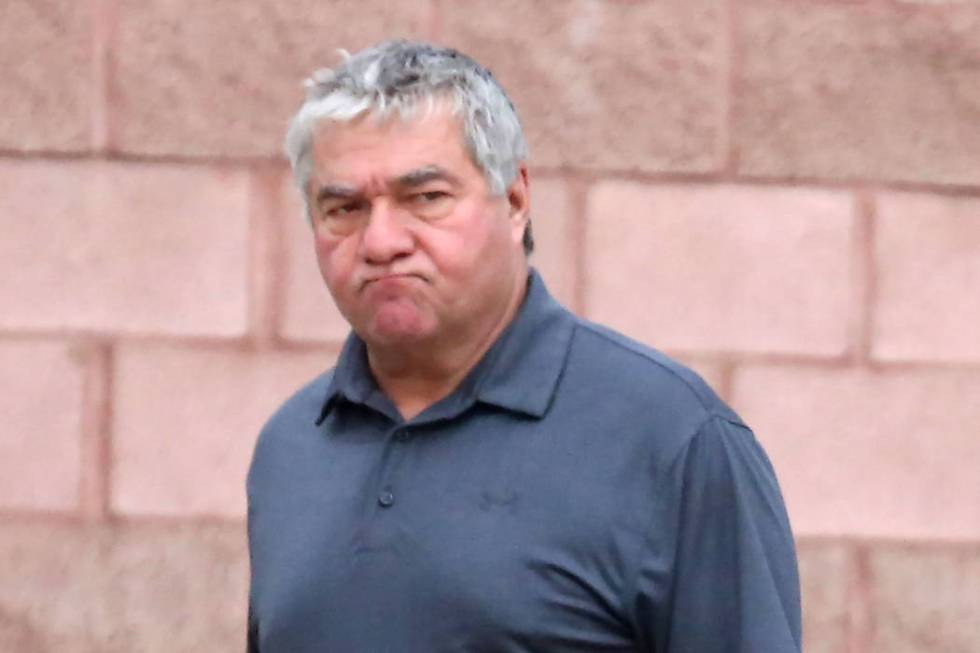AG office asks about Henderson constable spending exposed in RJ story

Nevada Attorney General Adam Laxalt sent a letter to county prosecutors asking if they plan to investigate Henderson Constable Earl Mitchell after a Las Vegas Review-Journal story showed questionable use of county funds by Mitchell.
The letter, sent to the Clark County district attorney’s office on Thursday, is likely the first step in an attorney general’s office probe of Mitchell if local prosecutors do not act, legal experts say.
Mitchell wrote himself $70,000 in checks from deputy salary funds, took out $1,700 from ATMs in casinos and video poker bars and used county money for trips to towns where his children live, records obtained by the Review-Journal show.
The AG letter cites the Review-Journal story and a law that allows state law enforcement to step in if the Clark County district attorney does not pursue a criminal investigation.
“On March 21 and 22, 2018, the Las Vegas Review Journal published articles alleging suspicious financial activities by Henderson Township Constable Earl Mitchell, an elected officer of Clark County,” the letter said. The “Office of the Attorney General may investigate and prosecute county officers for any criminal offense committed in the course of their duties” if the DA fails to act.
Paul Padda, a former assistant U.S. Attorney, said there is no guarantee of an indictment but it is clear that either the attorney general or district attorney will investigate whether Mitchell broke state law.
“Your article got their attention,” he said. “There is interest and discussion in government about the situation that could end up leading to a criminal prosecution.”
State law says the district attorney’s office has the right of first refusal in prosecuting county officials on allegations of official misconduct, but the attorney general can step in if county prosecutors will not act or have not responded within 30 days to the AG’s inquiry. If the district attorney’s office plans to prosecute, they have 90 days to bring an indictment, the law says.
Deputy District Attorney Christopher Lalli said Monday that he has not seen the letter, which was obtained by the Review-Journal under the state’s public records law. The attorney general’s office also declined to comment on the matter.
Constable bank records show that $151,000 of the nearly $1 million Mitchell requested in 2016 and 2017 for deputy pay was not paid to his staff. Instead, Mitchell wrote himself checks from the account, withdrew cash at ATMs or used the debit card for expenses such as meals and travel that were not approved by the county, as required by state law.
On March 21, Mitchell bowed out of his re-election bid hours before the Review-Journal posted the story detailing his spending. He has declined requests to answer questions about the constable fund and directed inquires to his attorney, Damian R. Sheets.
Sheets said Mitchell has done nothing wrong and the audit will show that.
“This is a giant misunderstanding perpetuated by a person with an ax to grind against my client,” he said. “When the audit is done, it will show (Mitchell) has not taken a dime he is not entitled to.”
In response to the story, legal experts said the questionable spending warrants a criminal investigation.
Craig Mueller, a former deputy district attorney who is running for Laxalt’s job as Laxalt makes a bid for governor, said he would send a couple of investigators “to poke around and see what it is” if he was heading the AG’s office.
Lalli said last week that police, likely in Henderson, would have to bring them a case. Henderson Police Department spokesman officer Rod Pena said his department has not opened an investigation and directed inquiries to the Las Vegas Metropolitan Police Department. Metro did not respond to an inquiry from the Review-Journal about a possible investigation.
The attorney general’s office has its own internal investigators who could handle such a case if local officials do not act.
Padda said criminal investigations of this sort typically take six months to a year but he cautioned that it was too soon to know if there would be an indictment.
“They usually act pretty quickly,” he said.
Contact Arthur Kane at akane@reviewjournal.com. Follow @ArthurMKane on Twitter.